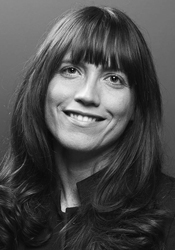
I am thrilled to announce Assoc. Prof. Kimberly Novick as the recipient of the 2019 Thomas Hilker Award, for her cross-disciplinary work that elucidates key physiological mechanisms that govern ecosystem interactions with a changing climate and for her leadership service to environmental observation networks for the study of land–atmosphere feedbacks at policy- and management-relevant scales.
I have known Kim since 2001, when she conducted and published an undergraduate thesis exploring how the carbon balance of grassland ecosystems responds to periodic drought and harvest. With her Ph.D., she extended her work to forests, considering how canopy architecture provides hydraulic constraints on leaf gas exchange, and then used this knowledge to improve our understanding of how plant defense is altered with elevated atmospheric carbon dioxide. At Indiana University, she focuses on land–atmosphere interactions in the eastern United States, where the combined effects of co-occurring changes in land cover and climate have been occurring for centuries now. Using long-term AmeriFlux records, Kim and her collaborators have demonstrated a persistently high carbon sink in maturing eastern U.S. hardwood forests, in contrast to expectations from ecological theory. However, by recognizing that plants operate along a continuum of water-saving (isohydric) to carbon-maximizing (anisohydric) responses to water stress, her work shows that the decline of anisohydric oaks in the eastern United States will make these forests more sensitive to water limitation in the future. Likewise, her lab’s influential work to disentangle plant physiological response to declining soil moisture and rising vapor pressure deficit during drought has clear implications for drought tolerance of future ecosystems in a climate that will be characterized by higher vapor pressure deficit.
For these reasons, all her letter writers agree that Kim should receive the Hilker Award—for bridging biogeosciences, ecophysiology, and climate science and transforming them into a field that addresses pressing societal problems.
—Gaby Katul, Nicholas School of the Environment, Duke University, Durham, N.C.; and Paul Stoy, University of Wisconsin–Madison

Terrestrial evapotranspiration is the second‐largest component of the land water cycle, linking the water, energy, and carbon cycles and infl...




